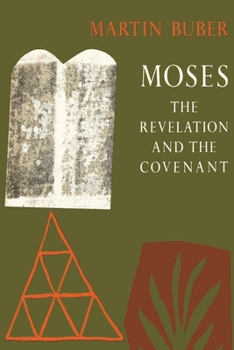Moses: The Revelation and the Covenant
Select Format
Select Condition 
Book Overview
"To the best of my knowledge," writes Martin Buber of this book, "what has been attempted here is the first comprehensive attempt of its kind." Buber, steeped in the literature of the Old Testament as he is, here seeks to disengage history from saga and to convey the meaning of Sinai to the 20th century. In this book a fascinating attempt is made to depict the historical Moses. The work is rich in brilliant comment. He has profound things...
Format:Paperback
Language:English
ISBN:1773237632
ISBN13:9781773237633
Release Date:April 2021
Publisher:Must Have Books
Length:226 Pages
Weight:0.55 lbs.
Dimensions:0.5" x 6.0" x 9.0"
Customer Reviews
1 rating
Ian Myles Slater on: Buber's Exodus and Wilderness
Published by Thriftbooks.com User , 19 years ago
"Moses," usually published as "Moses: The Revelation and the Covenant," is probably the most readable of Martin Buber's longer Biblical studies. It combines a sense of narrative movement with ingenious interpretations (often backed by formidable, if now obsolete, scholarship, almost always tucked away in endnotes), rhapsodies on freedom and the desert, reflections on the experiences described as miracles, and some hard political thought. For those familiar with traditional Jewish biblical interpretation, its influence on Buber's thought, and his willingness to work out implications by suggesting supplements to the biblical narrative, will be apparent. This combination makes "Moses" interesting to read, but difficult to classify. (It may also be a surprise to those who know Buber only from the philosophy of "I and Thou," or the story-telling of "Tales of the Hasidim.") Together with a much more difficult book by Buber, "The Kingship of God," it presents early Israelite religion as including a revolutionary social movement, egalitarian and anti-state, yet demanding accountability and public order. Similar ideas, usually less attractively expressed, and often less carefully nuanced, began to appear in the late 1960s or early 1970s, and in some cases remain influential. Buber's priority is not always acknowledged. Of course it is easy to believe that the ferment of their time was as influential on these interpreters as the first part of the twentieth century was on Buber, and that they came to their conclusions independently. Buber's "The Prophetic Faith" deals with the Genesis narratives, some of the Prophets, and Job, and for much of its length is less obviously political; in some ways, his study of modern socialist movements, "Paths in Utopia," is at least as closely related. Some readers, looking for traditional religious edification, will probably find Buber's presentation too rationalistic and secular. I am sure that there are those who will be upset by Buber's interpretation of Moses asking God for His true name, and the unhelpful answer, as showing the influence of Egyptian name magic. Others, encouraged at first by the footnotes and the assumption that the biblical text cannot be taken literally, will find him, well, too religious. If you approach "Moses" as the work of a religious philosopher with a strong interest in social issues, and a willingness to take the ancient text very seriously, but not literally, you will find much of interest. (Reposted from my "anonymous" review of June 15, 2003.)





